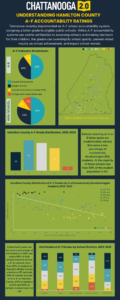Introduction to Tennessee’s Letter Grade System
Understanding how the new A-F letter grades are calculated and what they mean can be challenging, so we’re simplifying the process to help you stay informed. The Tennessee Department of Education rolled out the School Letter Grade Rating System in December 2023 as a response to a 2016 state law that mandated assigning schools annual A-F letter grades. A key goal of the legislation was to make school performance easily understandable for the public.
To ensure a comprehensive approach, the Tennessee Department of Education (TDOE) sought input from a diverse range of stakeholders, including educators, parents, and community members. They organized town halls, engaged in discussions with district superintendents, and gathered nearly 300 comments during the public feedback phase. The discussions and feedback included ideas about what should be included in the letter grade and how much weight each factor should be given within the grade calculation. Hamilton County Schools engaged in the public feedback process and provided a memo to the state with their recommendations. Despite facing initial setbacks due to testing issues and the COVID-19 pandemic, Tennessee is now implementing this grading system for the first time.
What’s Included in a School Letter Grade
Determining school letter grades involves considering several factors. These factors include student achievement, academic growth, and a tailored measure of college and career readiness for high schools. Student achievement reflects how well students grasp grade-level skills based on the state TCAP test. The growth measure contains two parts, one focused on overall student progress (how well kids are advancing based on state tests) and one on the growth of the school’s lowest-performing students, highlighting the importance of supporting these individuals. For high schools, the letter grade includes college and career readiness, evaluating success based on metrics such as ACT scores, college credits, industry credentials, and military readiness among graduating students.
Challenges and Limitations of School Letter Grades
The intent of the law was for schools to be objectively evaluated; however, school letter grades are an imperfect tool because it’s hard to accurately represent a school (or a student) with a single measure. Other states have adopted similar grading systems, but recently, numerous states have discontinued using these systems, citing that these grades don’t give a full picture of what is occurring in schools.
Critics have raised concerns about the formula’s weighting, particularly the weighting of a school’s growth. In Hamilton County Schools’ fall memo on the subject, they argue that growth, indicative of a school’s progress over time or how much students are progressing year over year, should carry more weight than academic achievement as it often better reflects a school’s success. Research has shown that student achievement (scores on annual state assessments) alone is strongly correlated with socioeconomic status.
To test this, Chattanooga 2.0 ran an analysis on school letter grades compared to socioeconomic status for schools in Hamilton County. We found that the emphasis on student achievement in Tennessee’s A-F letter grade formula leads to a strong association between A-F letter grades and socioeconomic status.
In Hamilton County, the data reveals a stark contrast in letter grades among schools based on their student demographics. Fourteen schools in Hamilton County were awarded an A letter grade, while only three received an F. The schools that earned A or B grades are primarily those with a lower percentage of economically disadvantaged (ED) students, with the majority serving a student body where less than 50% are designated as ED (see infographic below).
Conversely, schools that received D and F grades predominantly serve ED students. This observation highlights the correlation between student socioeconomic backgrounds and school letter grades observed across districts not just Hamilton County.
Recognizing External Factors Impacting Schools
While the implementation of the School Letter Grade Rating System in Tennessee aims to provide transparency and accountability regarding school performance, letter grades are unable to capture the nuances of day-to-day life within a school. School letter grades fail to consider the strengths and challenges of the communities a school serves. As a community, we strive for all our schools to be successful, because we know the crucial role, they play in setting our students on a path to success. However, our schools can’t do it alone. It is evident that the external challenges faced by children and families, such as poverty, housing instability, and food insecurity, significantly influence the success of our students and our schools. We will be releasing new dashboards in the coming months to help us better understand the external factors influencing our students. Stay tuned!






